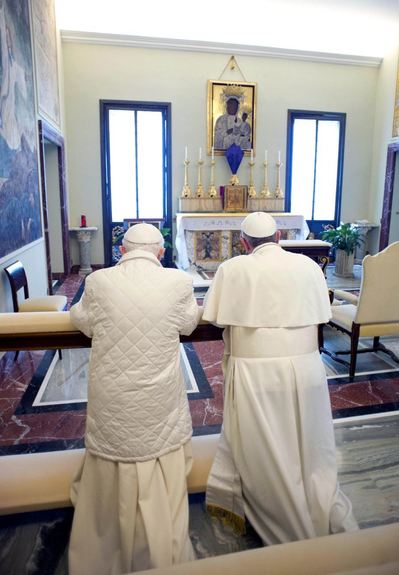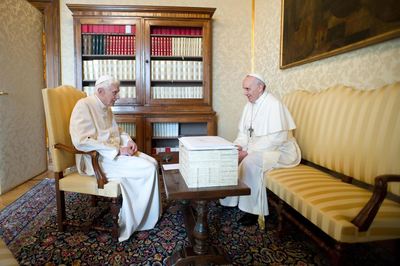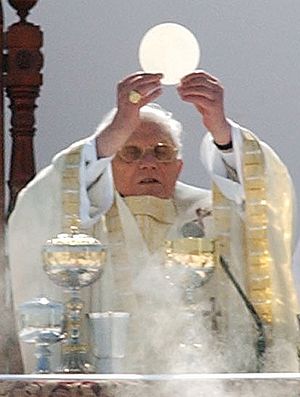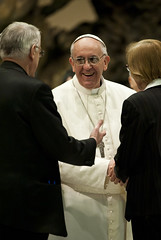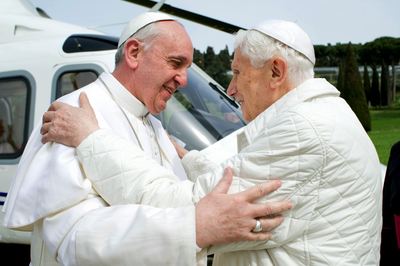
Pope Benedict XVI: March 2013 Archives

The Church needs reform, as always, a personal conversion. Turning to Jesus Christ is an act of freedom. What baggage do we have that would prevent change, or hinder me from confessing and living differently as a Christian? Reform starts not with institutional works, but with oneself. Governance is not the only issue that we have to be vigilant of with this new papacy; conversion of life starts locally and spreads. As Francis said yesterday in his first Mass as the Bishop of Rome, we need to walk, to build, to confess with, for and by each and every person so that we see the glory of God. We need to untie the knots that were spoken of by Saint Ireneaus. All this talk of reform includes the Curia, it is not business as usual. The Pope will remind us and lead us by his own life. He now holds office as the Vicar of Christ. He has suffered much close to To that end, today Pope Francis spoke to the gathered cardinals in the Sala Clementina. His address follows.
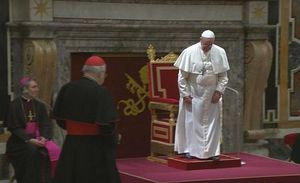
This period of the Conclave has been filled with meaning not just for the College of Cardinals but also for all the faithful. During these days we have felt almost palpably the affection and solidarity of the universal Church, as well as the attention of many people who, even if not sharing our faith, look upon the Church and the Holy See with respect and admiration.
From every corner of the earth a heart-felt chorus of prayer was raised by Christian peoples for the new Pope, and my first encounter with the crowds filling St. Peter's Square was an emotional one. With that eloquent image of a praying and joyful populace still fixed in my mind, I would like to manifest my sincere gratitude to the Bishops, priests, consecrated persons, young people, families, and to the aged for their spiritual closeness which is so touching and sincere.
John Allen quoted Pope Benedict about the role of the Holy Spirit's work in the conclave:
Cardinal Joseph Ratzinger was asked on Bavarian television in 1997 if the Holy Spirit is responsible for who gets elected. This was his response:
I would not say so, in the sense that the Holy Spirit picks out the Pope. ... I would say that the Spirit does not exactly take control of the affair, but rather like a good educator, as it were, leaves us much space, much freedom, without entirely abandoning us. Thus the Spirit's role should be understood in a much more elastic sense, not that he dictates the candidate for whom one must vote. Probably the only assurance he offers is that the thing cannot be totally ruined.
Further:
There are too many contrary instances of popes the Holy Spirit obviously would not have picked!
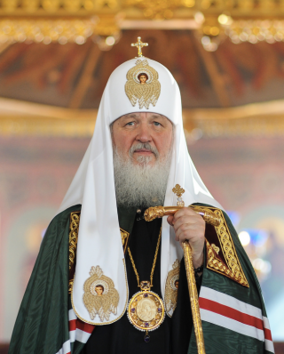
If you want to read a beautiful letter from the Orthodox Patriarch of Moscow, Kyril I, to Pope Benedict XVI, read the following.
On 1 March 2013, His Holiness, Patriarch Kyril I of Moscow sent a message to His Holiness, Benedict XVI, pope-emeritus.
Your Holiness!In these exceptional days for you, I would like to express the feelings of brotherly love in Christ and respect.
The decision to leave the position of Bishop of Rome, which you, with humility and simplicity, announced on February 11 this year, has found a ready response in the hearts of millions of Catholics.
We have always been close to your consistent ministry, marked by uncompromisingness in matters of faith and unswerving adherence to the living Tradition of the Church. At a time when the ideology of permissiveness and moral relativism tries to dislodge the moral values of life, you boldly raised your voice in defence of the ideals of the Gospel, the high dignity of man and his vocation to freedom from sin.
Pope Benedict XVI, who finished his pontificate yesterday (28 February 2013), is considered to be one of the most brilliant minds in a century.
From its humble beginning to its historic conclusion, Benedict's pontificate will be remembered for its prolific teaching. Benedict reminds us that logos precedes ethos, and that discerning beauty is essential in the pursuit of truth. Through the Holy Father's teachings, Mr. Candela will explore the practical reforms that gave voice to Catholic musicians and artists who in previous decades had been relegated to "the rearguard of culture."
Support my friend in this very worthy endeavor.
The flyer: Teaching Beauty.pdf
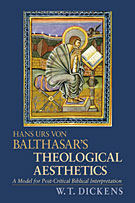 I can't verify this information personally but Salt and Light TV heard the news bite, and it sounds right, that one of the books Benedict XVI will be reading in his retirement is W.T. Dickens' Hans Urs von Balthasar's Theological Aesthetics: A Model for Post-Critical Biblical Interpretation (UND Press, 2003).
I can't verify this information personally but Salt and Light TV heard the news bite, and it sounds right, that one of the books Benedict XVI will be reading in his retirement is W.T. Dickens' Hans Urs von Balthasar's Theological Aesthetics: A Model for Post-Critical Biblical Interpretation (UND Press, 2003).